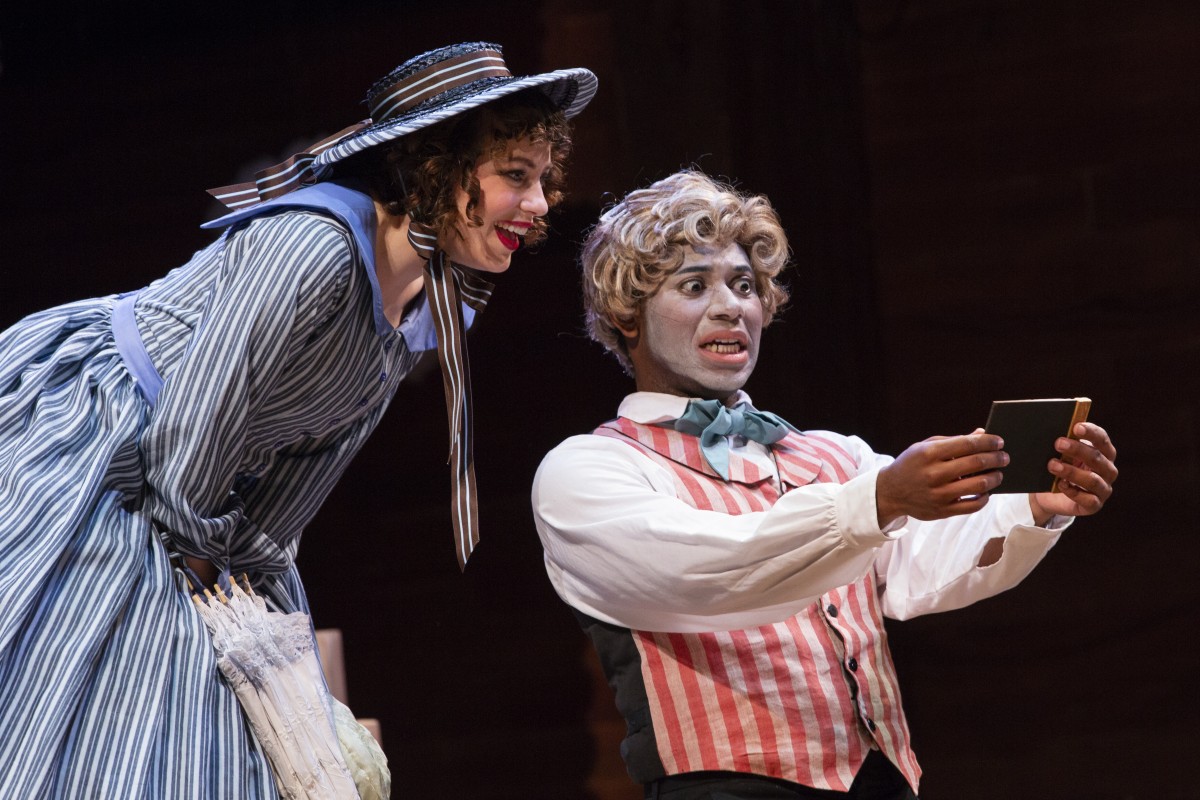The first time Stori Ayers saw An Octoroon in Washington, D.C., she didn’t know what to think. Years later as the assistant director for Chautauqua Theater Company’s production of the play, Ayers said she has yet to unravel everything An Octoroon has to say about race in America.
“Branden Jacobs-Jenkins, the playwright, he’s either a genius or we’re just reading into a lot of things,” Ayers said. “I think I’m leaning toward genius.”
An Octoroon concludes its run at Chautauqua with performances at 2:15 p.m. Saturday, July 7, and 2:15 and 8 p.m. on Sunday, July 8 in Bratton Theater. Ayers and CTC Artistic Associate Sarah Wansley have been leading, and will continue to lead, talkbacks after every show to help audience members process what they see on stage.
Ayers said the play has a heavy focus on slavery, but its message carries over to the 21st century.
“I’m finding a lot of parallels in terms of pulling back those layers between then and now, and not just direct parallels,” she said, “but how seeds of things were planted then … and how those things are now manifested. It’s really fascinating to see.”
The company had two weeks to put An Octoroon together. As an act of self care, the actors took time to debrief the play’s challenging content throughout the rehearsal process.
In addition to the show’s proximity to slavery, CTC Managing Director Sarah Clare Corporandy said that An Octoroon’s actors of color had to grapple with being a minority on Chautauqua’s grounds.
“As we’ve been digging deeper into our programming and addressing diversity in our company, … we have learned that we need to prepare (people of color) for what they’re coming into,” Corporandy said. “This place is very special and has a lot of wonderful things about it, but it’s also very different from where most of us live.”
Early Sunday Morning
The cast’s need for self-care came to head after its opening night performance, when at about 1:30 a.m. Sunday, July 1, four actors of color were pulled over just inside Chautauqua’s main gate by a Chautauqua County deputy because the car’s taillights were not on.
Chautauqua County Sheriff Joseph Gerace shared the police dashcam video on Friday with the Daily. The video, which confirms that the taillights were not on, shows that the deputy, who was in the service lot across the street from Chautauqua’s Main Gate, turned on his flashing lights and followed the actors’ car into the Main Gate parking lot. The actors’ car stopped briefly in the parking lot, then continued to the gate, at which point the gate attendant pointed to the police car.
After being waved in by the gate attendant, both cars stopped. The deputy, a white man, called in his location before he got out and approached the driver’s window. The driver, CTC guest artist Larry Powell, was asked for his license. Because the deputy said he could smell alcohol in the car, he also asked Powell if he had been drinking. Powell replied that he was dropping people off on the grounds and that he was the designated driver. The deputy then asked Powell to leave the car. Gerace said it is standard procedure to separate the driver from the vehicle and its occupants in order to determine sobriety.
After stepping outside the vehicle, Powell said he had photos of his driver’s license on his phone. He explained that he was an actor from Los Angeles driving people home from a theater company party and that it was his birthday. The deputy asked Powell if he was only in town for the summer, which he confirmed.
The deputy told Powell why he was asked to leave the car and that he had been pulled over for his taillight. The deputy then asked Powell if he was sober, to which Powell responded that he had had traumatic experiences with the police. The deputy asked again if Powell was sober, and Powell replied that he was.
At that point, another car full of CTC company members pulled up behind the deputy. As one attempted to leave the car’s back seat, another said “Larry is sober.”
The deputy asked the second car to pull forward and keep a distance. After the car pulled forward, CTC Artistic Director Andrew Borba got out of the driver’s seat and told the deputy from a distance who he was.
As Powell was looking for the photo of his license on his phone, the deputy told Powell he was confident in Powell’s sobriety and that he could go. Moments later, Powell showed a picture of his license to the deputy. The deputy wished Powell a happy birthday and released him without a ticket or warning. The video shows that the encounter lasted four minutes and no sobriety test was given.
“I am very satisfied with the process the deputy used,” Gerace said. “He was very polite, very respectful, as was the operator of the vehicle. I couldn’t have scripted a better interchange between the driver and the deputy. This definitely did not have a thing to do with race, from the stop to the final outcome.”
Still, Powell said that he and the other company members were shaken by the encounter. Powell said that he has been pulled over by police at least 30 times in his life and that last weekend was the second time this year. Powell also said that his uncle died after an encounter with a police officer.
The day after the encounter, CTC held a private meeting to discuss what happened. Chautauqua President Michael E. Hill, Vice President of Performing and Visual Arts Deborah Sunya Moore, Vice President of Religion and Senior Pastor the Rt. Rev. V. Gene Robinson, and Robert Franklin Jr., Robinson’s predecessor who was visiting Chautauqua, were in attendance.
Both performances of An Octoroon went on as planned; however, rehearsal for CTC’s next production, Airness, was canceled so that the actors could support their friends during the matinee and evening post-show talk-backs. On Friday, July 6 a screening of Powell’s film, “Mother’s Milk: A Film Quilt” was held at Chautauqua Cinema as a step toward healing.
Hill addressed the encounter in a column in the Thursday edition of the Daily and met with Gerace on Friday afternoon to discuss what happened.
Borba said he wants to see Chautauquans make their community a safer place for everyone.
“Chautauqua is an aspirational community for people to be their best selves, and I personally and we as a theater company subscribe to that wholeheartedly,” he said. “I think that oftentimes that allows us to believe that when we step inside the gates, America ceases. That’s not true. If we are truly an aspirational community, … this has to be a charge for all of us to be change agents.”
Borba said that Chautauquans with the privilege to do so should step up as allies.
“For those of us who can, we need to be carrying more water,” he said. “We need to be doing work because those of us who are not able to as much shouldn’t be asked to bear that burden over and over and over again.”
Providing Context with Care
Before rehearsal began, Wansley provided the designers and actors with a packet of historical context about the play. Much of this information is also shared with audience members before and during each performance.
Displays on Bratton’s porch explain the folktale origin of Br’er Rabbit and the common stock characters in melodrama, while ushers distribute background information about An Octoroon’s development at the play’s intermission to explain its metatheatrical framing device.
“We do think that having that context about both the development of this play and the original The Octoroon is helpful for getting a richer understanding of the play, but we actually didn’t want you to know all that in Act 1 where some of that story is revealed,” Wansley said.
Ayers said that some audience members may feel alienated by An Octoroon’s depiction of enslaved men and women in the antebellum South, which can appear insensitive at first glance.
“It’s hard to see the play and understand if you don’t understand how melodrama, or understand how satire, works,” she said. “It can be a little tough to watch.”
An Octoroon satirizes the use of blackface, whiteface and red face makeup. This is not done out of necessity — the cast is diverse in race and national origin — but as conscious commentary on how people of color have been misrepresented in theater.
Because actors apply the makeup on stage in front of the audience, costume designer Sarah Nietfeld said she chose makeup that could be applied simply while staying true to the practice’s racist history.
“The makeup is really iconic to those horrible old stereotypes in 19th-century makeup,” Nietfeld said. “You see that transformation and look on, hopefully, with horror as you see that happen.”
The origin of blackface traces back to the Elizabethan era, when white actors would darken their faces to play roles like Othello and Cleopatra.
Before the advent of vaudeville, white performers in the United States would apply burnt cork to their faces in order to entertain audiences on the minstrel circuit. Their offensive impressions of black people depicted “happy slaves” who were lazy, dumb and superstitious.
The use of blackface continued into 20th-century entertainment with films like “The Birth of a Nation” and “The Jazz Singer,” while actors Laurence Olivier, Shirley Temple and Robert Downey Jr. have also used makeup to play black characters.
In An Octoroon, CTC conservatory actor Keshav Moodliar applies blackface to play two enslaved characters: a young boy named Paul and an elderly servant named Pete. He said that the makeup, while disturbing, serves a purpose to the play’s satire.
“It makes you feel very uncomfortable, but that is the purpose of the play and that is what (Jacobs-Jenkins) wrote,” Moodliar said. “Hopefully, that is the message that people will leave with: how absurd this is that this had to happen and that this is happening today.”
Because An Octoroon addresses some difficult subject matter, CTC conservatory actor Johnique Mitchell said that creating a safe space in the rehearsal room was key. At the suggestion of director Giovanna Sardelli, actors were allowed to pause rehearsal at any time to express their discomfort.
“I am very grateful for that in our rehearsal process,” Mitchell said. “There were some hard times that we triumphed, conquered and got over, and the actual result made us closer. I have a different point of view on certain topics now because my cast and my assistant director and director have taught me so many things through this process.”
Mitchell also said she took steps to distance herself from her character, an enslaved woman named Grace.
“I would wear my own skirt in rehearsal … just to remind me of my me,” she said. “Although slavery was part of my heritage, I don’t have to carry that baggage.”





